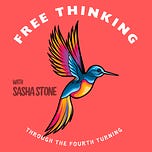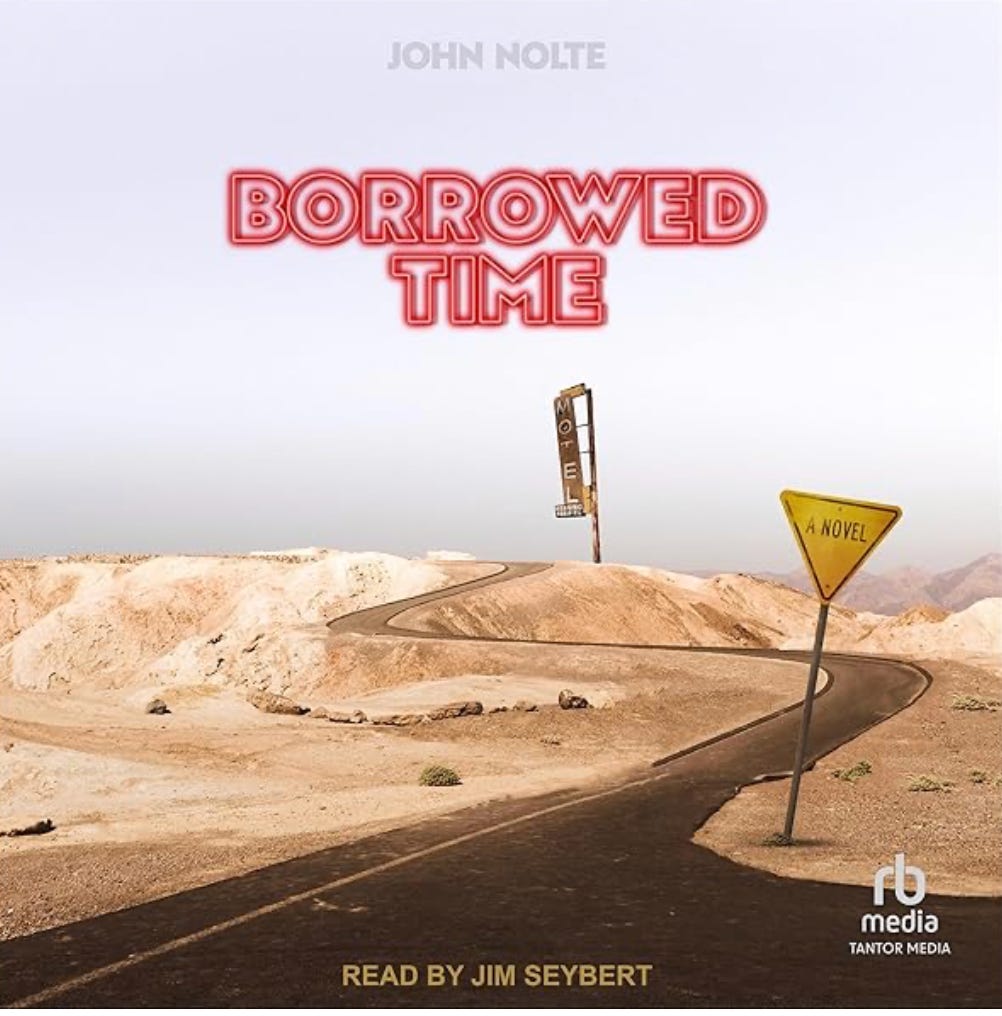“And so shines a good deed in a weary world,” that’s the line that ran through my head as I finished John Nolte’s first novel, Borrowed Time. The truth is that I didn’t want it to end. I didn’t want to leave that imaginative world and have to face the reality of ours.
I had already started it over just before the last few chapters to stave off the inevitable. Was it the book’s protagonist I liked so much? A man blessed (or cursed) with immortality who falls in love for the first time in thousands of years with someone who does get old and die, like the rest of us?
Or was it something else: A distant call from the past, back to the days when stories were meant for everyone when we would all share the plight of characters so real we could almost reach out and touch them?
I read, or listen to, dozens — hundreds — of audiobooks. It’s how I pass the time on long road trips, enduring agonizingly boring chores I can’t bear to face, or when I need to turn my mind off from the day's news. I read almost exclusively mysteries, thrillers, pulpy stuff, with the occasional non-fiction book thrown in here or there about the Salem Witch Trials or Lizzie Borden.
I usually don’t touch literary fiction anymore. I can’t bear to. I know what to expect because I know that world all too well by now. There will be a “lesson” in there, one I can already see coming from a mile away.
As with almost everything else, the “woke mind virus” has infiltrated book publishing, with sensitivity readers and social justice fanatics roaming the halls, threatening to walk out if Woody Allen dares publish a memoir. The reversed hierarchy is mandated. The “message” is a foregone conclusion.
Anyone who reads Nolte’s Breitbart column, knows he can turn a phrase. No one can slice and dice Hollywood like he can. But somehow, he took a chance on writing fiction and hit a grand slam.
Nolte has said he didn’t want to write anything political. It’s not a seething indictment of the Left (although if you read between the lines…) or “cancel culture” or anything like that. Its value is that it exists far outside the squabbling of our daily lives.
Borrowed Time is a love story. It’s a horror story. It’s a near-future, dystopian fiction story. It’s as much about Nolte himself as it is about our modern world. It is about his peculiar perspective as an outsider observing every horrible and great thing humans have manifested. And it is about faith.
The novel is grouped into different parts that occur at different times involving a handful of characters whose lives cross paths for different reasons. No single character in this book gets the short shrift. Each has a unique backstory, from the most important to the least important, and comes to vivid life in our mind’s eye.
It is as grotesque at times as it is tender. It is horrific, and it is beautiful. It dwells in that binary as a story about the good vs. evil in our world and ourselves.
What would you do if you could live forever? It sounds great when you think about dying. But maybe not so great when you have to watch everyone you love die.
Here is one lovely bit of writing:
He pulled on his boots and tried to stand. His legs had other ideas. He dropped to his knees, fell forward on both hands, inhaled a deep breath, held it, and then held it some more. He held it until his head swam and his body chilled. He closed his eyes and held it until flashes from the past popped off in his head….
A wedding veil blowing through the wind.
A giant bow wrapped around a used pickup truck.
The touch of Doreen’s hand as she gave him the keys.
The taste of her kiss.
Her body arched in agony reaching for a call button.
He finally remembered to breathe, and when he opened his eyes, he realized he was running—running just as fast as he could.
And then, in another vivid passages, he writes:
Anyone eager to wrap their minds around a scenario that only ever ends in a horror show, need only picture a world where no one dies. Forget over-population, focus on human nature.
Let’s start with the one thing no one ever thinks of. Not everyone’s rich, you know. Most aren’t. And for those who aren’t, if you take an honest look over their personal horizon in a world where no one dies, there’s no retirement, no pension, no social security, no rest. Living forever sentences you to grinding out a living forever. Believe me, I know.
You want to spend eternity in a cubicle pushing papers? You want to dig ditches, cut grass, change oil, wait tables, enter data, deliver mail, sell cars, drive a bus, write code, work in a factory, wash dishes, cut hair, fight fires, groom dogs, mop floors, write briefs, clean teeth, patrol streets, sell homes, stock shelves, make beds, flip burgers, and stand behind a cash register forever?
How about a planet full of assholes? Is that what you want, a world buried in thoughtless, judgmental, unforgiving, forever-young narcissists never compelled to wise up by the coming of the abyss?
Don’t you understand, it’s the cold truth of dying that forces a man to face the fact there’s no endless supply of tomorrows. It’s death’s unrelenting approach that says you need to become a better man, a better husband and father—now, right now, before it’s too late. Now is the time to forgive, to beg forgiveness, to say “I love you,” and take hold of what matters.
Don’t you get it? It’s the harrowing knowledge of our limited time that separates us from animals. You want to live in a world without that? Trust me, you don’t.”
If our country’s cultural arbiters weren’t corrupt, Nolte’s Borrowed Time would sit atop the bestsellers list at Audible or the New York Times. It would have been reviewed in Newsweek and various other outlets as he rode the publicity train all authors must endure to get the word out.
But Nolte has had the bare minimum of attention on this book. That’s because we live in a society where only those accepted into the Left’s utopia are given the space to thrive as artists. Yet, those stories only matter to them, not the rest of us. But little by little, the counterculture is building a little gulag on the other side of their “paradise.” John Nolte’s Borrowed Time lives in it. It is a book for everyone, not just a select few.
Borrowed Time, therefore, is not a “right-wing screed” as people like Rachel Maddow might assume it would be. He’s too smart to waste his time on that. There is some politics in it, to be sure, and a cautionary tale of where all of this ALL AT ONCE is heading.
But ultimately, this is a human story. If you are uncomfortable with religion, parts of it might not resonate. And, if you aren’t comfortable with graphic depictions of violence or curse words, you might have a tough time getting through some of it.
But ultimately, I felt immediately safe in this writer’s hands and spending time inside the mind of John Nolte. It’s one of those books that expands outward as it goes along, from the desert to Washington DC, from the past all the way into the future. It tells us what is eternal and what is only fashionable for a moment.
Borrowed Time soothed my aching heart in many ways. It made me think about the things that really matter in life and the things that don’t. It made me think about true love, about finding one person to spend your life with - something that has always (and probably will always) eluded me. And it made me think about death, about why we need to believe there is a hereafter because, without it, life becomes unbearable.
Nolte is a magical realist in his writing. It is reminiscent of the Southern Gothic tradition, Carson McCullers and Flannery O’Connor. Like those writers, he is a keen observer of human nature and has spent his life watching and listening. He paints for us characters who are sometimes awful, sometimes wonderful, sometimes a mixture of both, but ultimately unforgettable.
When Nolte interviewed me for Breitbart, a friend I used to know, a writer who feels the warm embrace of the publishing industry, DM’d me and said, “How can you interview with him? Do you know what he writes? Do you know what he calls people? What he says about transgender clinics and parents?”
“But how could what he wrote be any worse than what they’re actually doing?” I said.
Besides, I’ve learned my lesson about judging others. I don’t want to live among people who think it’s perfectly fine to exile, marginalize, and un-person those who offend them.
I don’t want to live behind a “blue wall,” united in hatred like so many on the Left are now, lawn signs notwithstanding. They might have all of the culture, money, and power, but very few of them know how to tell good stories anymore, and even if they did, they would not be allowed to tell them.
“So shines a good deed in a weary world” comes from Roald Dahl’s Charlie and the Chocolate Factory. I don’t need to tell you what happened to Dahl this past year as the “woke” came for yet another perfect thing to keep the village pure and righteous. Nolte named one of the book’s main characters after Charlie. We don’t find out why until later in the book, and I won’t spoil it for you, but suffice it to say his fate, like Charlie’s in the book, is also tied to pure dumb luck.
Nolte’s Charlie is in the care of the book’s protagonist, Mason, but Mason is perhaps blinded by love when it comes to the evil that takes hold of Charlie. And because of that, humanity pays too high of a high price. Mason’s ignorance of Charlie’s evil is his tragic flaw, leading to untold horror and suffering.
Can he be redeemed for his ignorance? Can he undo the damage? Or is it all just about finished anyway, as humanity heads toward its total collapse? These questions are asked, not answered. Nolte is taking you somewhere, and you are rewarded for your time. What you take away from it will depend on what you believe about your own fate.
If you follow Nolte on Twitter, you’ll know two things about him. He loves his wife, and his wife is enduring serious health problems that have her in and out of the hospital.
You’ll also know that their best days are when they hitch up the RV and drive it to a camping site where they spend their nights disconnected from the madness of our world. And no doubt, gazing up at the stars. Beauty that is all around us all the time and doesn’t cost a thing.
I highly recommend Borrowed Time. You can buy the book here, or the audiobook here.
//end















Share this post